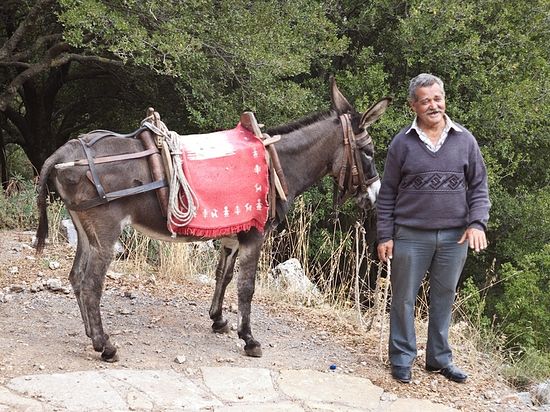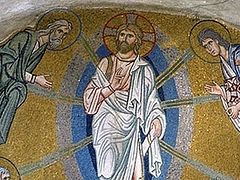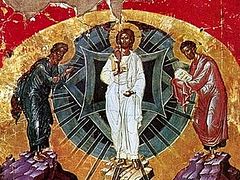
This is what happened to me once. I was then still a very young priest serving near Thessaloniki. At the same time, I was assistant to a famous theologian, studied theology, and was preparing to defend my doctoral dissertation in a theological university. I was deeply troubled by the disparity between what I taught and what I encountered as a priest. On the one hand, in the university I had partaken of everything best and great that theology has to offer, the incomprehensible and most deeply meaningful, while on the other hand I tried to convey it all to people as the priest serving ten villages that had been assigned to me by the local bishop. In three of them I regularly preached to the people and saw that they don’t understand me—or at least that is how it seemed to me at the time. I felt absolutely alone.
In my sermons I would touch upon some theme, give a little speech, see that people were thoughtfully hanging their heads, and then observe that they would go and live as they always had, as if nothing had happened and they hadn’t heard anything I said. This loneliness was a burdensome feeling and I said to myself: what should I do as a priest in such a situation, what sense does it make to go again every Sunday to church and talk with these villagers… I am not saying that this is easy—as I have already explained, I had not chosen the simplest style of sermon, but I am convinced that my listeners were quite capable of understanding what I tried to convey to them. And although I have learned much since then, at that time in my life this was a serious problem for me. Until the following miraculous incident happened to me, by which the Lord taught me a good deal more than what I knew.
One Sunday after the end of the Divine Liturgy, I was approached by a priest, a very simple man, and two church guardians—the simplest, most uneducated people—who said, “Don’t just leave without talking with us. Okay?” The Liturgy ended and I, as always, remained alone with my sorrows. We went to drink coffee in the café on the village square. We sat there drinking coffee, when suddenly one of the church guardians turned to me, looked at me attentively and said, “Listen, father—me and Mr. Yannis (Yannis was the second church guardian) had great doubts. Since our church had not yet been consecrated by the bishop, were the Sacraments served in it canonical, or not?”
I said to them, “Oh, oh, what is going on here?” Their degree of perplexity had produced a great impression on me. He went on: “Do you know what we did? We decided to fast for three weeks so that the Lord Himself would settle our doubts. We started fasting, and truly, one Sunday, even before the bishop had come to consecrate the church, at the Liturgy we saw the light again.” I starting speaking loudly, “What light? What light are you talking about?” “You know, that light—it’s not like the sun, you look at the sun afterwards and it seems to you that you’re looking at darkness. That light, when it comes down, you start seeing everything completely differently. You start seeing completely different things, different events, different states, present, past, and future in it,” he tried to explain.
I was so taken by this. I was sitting amidst simple folk who had experiences similar to those of St. Gregory Palamas and St. Simeon New Theologian! And of course, they had been blessed by the priest who served the Liturgy, and who was sitting there with us. This absolutely uneducated father just nodded his head in agreement: “Yes, yes, we were all there, that is how it was…” Filled with tender admiration, I of course began to probe for the reason why these folk in particular had this experience and I questioned this exceedingly simple, uneducated man.
“Tell me, how do you live?” (I asked him the question because I had felt a shock that would follow me many years afterward.)
“Eh, how do I live? I am poor.”
“No that’s not what I mean. How do you spend your days? What extraordinary thing do you do?”
“Ah, I don’t do anything out of the ordinary. I just love God and endure a little. I just endure.”
He had patience. Do you know what patience is? Patience means carrying your cross voluntarily, and it embraces all other people. And God is revealed to you in that cross.
This was a remarkably great proof of the fact that hesychasm is a natural science of life; and don’t think, you theologians, that hesychasm is a personal attainment like some states achieved in Hinduism, or the attainment of those who annihilate their own will in order to see visions. It is through this real path of hesychasm that there have been many revelations—which I, a master of theology, have not been vouchsafed from that moment on, nor am I likely to be so in the future.




A friend of mine, Dr. Jean-Claude LARCHET who knows the priest concerned and has heard this very story from him, told me that it is in fact Father Nikolaos Ludovikos, Professor at Thessalonica Orthodox Academy ( and at the Institute for Orthodox Christian Studies in Cambridge, and not a Father Andrew Ludovic as indicated at the beginning of the article, who wrote this anecdote.
See his profile here: http://en.wikipedia.org/wiki/Nikolaos_Loudovikos
Yours in Christ,
hypodeacon Claude (Lopez-Ginisty)
Thank you for the great variety and quality of your posts. I very often translate them and put them on my blog!